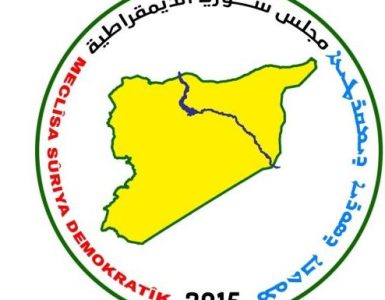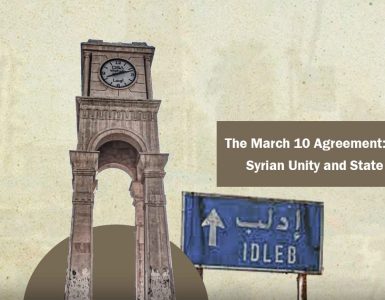By Ammar al-Maatouq
Damascus, Syria (SDC) – The Syrian crisis is deeply complex and multifaceted, affected by a series of challenges that have stalled the political process at all levels. Moreover, the Syrian issue has become a battleground for regional and international power struggles. These powers use the Syrian situation to convey their political and military messages. This matter has led to numerous challenges regarding Syria’s future and the Syrian people’s vision on the political situation in Syria. On the other hand, as a result of regional interests, the Syrian regime continues to disregard the aspirations and demands of the Syrian people. The ongoing Syrian crisis, which has persisted for 13 years, is influenced by complex regional dynamics and a lack of international pressure on the regime to find a solution.
Given the complexities of the Syrian crisis, the political initiatives proposed have failed to make any progress and have not contributed to end the suffering of the Syrian people.
The political initiatives related to the Syrian crisis were not serious about resolving it, as they were limited to proposing temporary solutions without addressing the main causes of the crisis, leading to the failure of these initiatives.
They have just focused on preserving the Syrian sovereignty and preventing the control on the Syrian territories. However, the best solution to the Syrian crisis lies in a comprehensive and serious intra-Syrian dialogue that prioritizes the interests of the Syrian people, free from any external interference. It is worth mentioning that all previous political initiatives have disregarded this truth.
Syrians Can Shape Their Country’s Future
Most of Syrians believe that the continuation of the Syrian regime to adhere its repressive policies towards the Syrian people does not resolve the Syrian crisis. This dire situation will be overcome through a political process that involves all Syrians without exclusion. UN Security Council Resolution 2254 was adopted with the aim of resolving the Syrian conflict through a political process. However, the intervention of external actors, particularly Russia and Iran in support of the Syrian regime, has undermined the resolution’s implementation, prolonging the suffering of the Syrian people.
Also: The Fourth Division’s Abuses Against Returning Syrians from Lebanon
Realistically, a strong Syrian base is essential for implementing UN Resolution 2254 and achieving a sustainable solution. This crucial matter can only be achieved by forging an inclusive political process led by Syrian national elites who are not affiliated to external entities. It is essential for Syrians to assume their responsibilities towards their country and support those who propose national projects aimed at political solutions in Syria.
In a related context, Hassan Merhej, a political researcher, has affirmed that intra-Syrian dialogue at this tense regional juncture has become a vital necessity for Syrians. Merhej emphasized that the obstacles hindering the launch of the intra-Syrian dialogue included internal and external challenges.
“Merhej stressed that the internal challenges preventing the launch of the intra-Syrian dialogue are attributed to the Syrian authorities’ refusal to engage in a national dialogue. This dialogue is aimed at resolving the Syrian crisis and shaping the future political structure of the Syrian regime.
This means that the regime fundamentally rejects the concept of engaging in a national dialogue. It is important to recognize that all proposals put forward by the regime are rooted in a framework of authoritarianism and totalitarianism. Furthermore, those individuals affiliated with the regime, who advocate for dialogue, propose the continuation of the regime’s authority, but in a more authoritarian form. Therefore, it is untenable to rely on the regime and its affiliated parties in any dialogue intended to resolve the Syrian crisis, as evidenced by numerous instances.
Merhej further added that the external challenges are linked to the intentions, objectives, and interests of the influential powers involved in the Syrian issue. Unfortunately, there are Syrians who are directly affiliated with the Iranian, Russian, or Turkish parties. Additionally, the Astana and Sochi talks, led by Russia, Iran, and Turkey, along with the Syrian regime, have marginalized politically significant Syrian parties. Consequently, a dialogue facilitated by these actors, that have dominated the political process to advance solutions serving only their own interests, will be futile.
Also: Syrians Struggle While Authorities in Damascus Prioritize Luxury Projects
Moreover, Merhej stated that the Syrian Democratic Council (SDC), has put forward several political initiatives and visions for a political solution in Syria. The SDC also has supported the intra-Syrian dialogue and addressed necessary concerns for unifying the Syrians. The dialogue seminars organized by the SDC fundamentally establish a political pathway for resolving the Syrian crisis. In addition, the Suwayda movement presents an opportunity that all Syrians must leverage to compel the Syrian regime to meet the aspirations of the Syrian people.
Most Syrians agree that the Astana and Sochi talks, along with other political processes sponsored by Russia, Iran, and Turkey, cannot serve as a basis for establishing a serious dialogue. These processes are viewed as insufficient for addressing the complexities of the Syrian crisis. Essentially, the talks serve external agendas affiliated to Iran, Russia and Turkey rather than addressing Syria’s internal issues. Also, the regime seeks to prolong the crisis by aligning itself with the interests of its allies.
In conclusion, the intra-Syrian dialogue remains the sole solution to save Syrians from the repercussions of the current crisis. This requires genuine national efforts that transcend external influences and prioritize the interests of the Syrian people. Achieving this comprehensive dialogue is the greatest challenge facing Syrians at this critical juncture.





